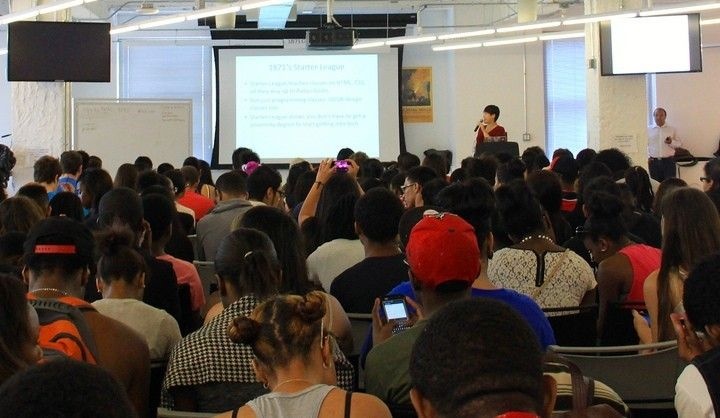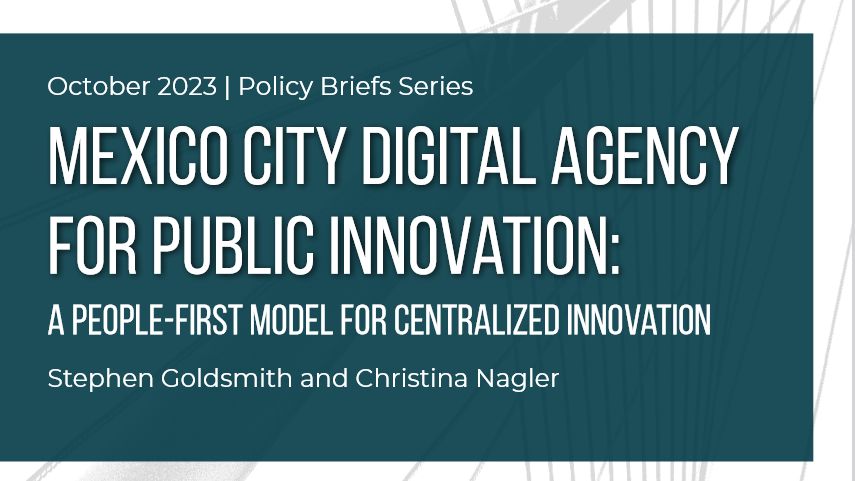- December 2, 2013
- Civic Data
In many places, civic innovation is thriving—people are strengthening their relationships with governments to improve their lives in unprecedented ways. Individuals and groups at the local level are what drive it: they’re harnessing access to data and technology to redefine how we interact with where we live. It’s the latest example of how the Internet has forever changed democracy in the 21st century.
However, like democracy itself, the modern civic innovation sector’s development has been an uneven and messy process. The foundation this movement’s built on—the internet—is still far from being an equally accessible and universally understood medium. Moreover, the Internet itself is not enough to spark civic innovation in cities: it’s the jumble of people, policies, leaders, and networks that need to coalesce to make things work.
In Chicago, that jumble is coming together to become one of the country’s strongest civic innovation centers, and it hasn’t been by accident. The Smart Chicago Collaborative (Smart Chicago), a small civic organization that’s dedicated to improving the lives of people through technology, is working at the center of Chicago’s civic innovation scene. Through its unique leadership, structure, and strategies, Smart Chicago has been able to develop and align key networks of people with policies and programs in order to produce results. The organization is a model for cities to capture civic innovation’s energy and use it in new ways to improve urban life.
A Community of Shared Learning
Roughly once a month, a meetup group called OpenGov Chicago unites more than 100 “civic hackers” and other curious city residents for a talk on Chicago’s latest developments in civic innovation. The meetups are a gateway for involvement—and a locus for action—in Chicago’s civic innovation scene.
At just about every one of those meet-ups, you’ll find Dan X. O’Neil. O’Neil, a founder and main organizer of OpenGov Chicago, can be seen at the entrance shaking hands and engaging with guests. A published poet and admitted archivist, he’s also meticulously documenting the event—its images, its words, its feel—on his camera and in his mind.
As Executive Director of the Smart Chicago Collaborative, O’Neil sees OpenGov meetups as part of a larger framework to bring disparate groups together towards a shared mission—Smart Chicago’s mission—of improving lives in Chicago through technology.
“We have to care about creating a community,” O’Neil tells me. “To get things done, organizations across the board—government, nonprofits, companies, foundations, you name it—need to interact with each other and feel like a community of shared learning.”
Forming the Collaborative
For Smart Chicago, playing the role of convener comes naturally: the organization itself was born out of cross-sector conversations between industry leaders on how to improve Chicago’s unequal access to the internet and technology.
In 2006, the City of Chicago created the Mayor’s Advisory Council on Closing the Digital Divide to bring together public, private, and nonprofit leaders and devise a plan. Following a year of public hearings, surveys, and interviews, the Council’s work culminated in a 2007 report titled “The City that NetWorks: Transforming Society and Economy through Digital Excellence.”
Of the report’s six major recommendations, one called for a new nonprofit organization led by philanthropic, municipal, and technology industry representatives, as well as community leaders. That nonprofit, to be housed at the Chicago Community Trust foundation, became the Smart Chicago Collaborative. In 2010, Smart Chicago was officially founded as a joint project between the Trust, the John D. and Catherine T. MacArthur Foundation, and the City of Chicago.
Smart Chicago’s multi-sector design was particularly beneficial for its first major task. The City of Chicago’s Department of Innovation and Technology (DoIT), a founding partner of Smart Chicago, applied for and received Federal grants for tech projects under 2009’s American Recovery and Reinvestment Act (ARRA). Specifically, DoIT received key funding for two programs under ARRA’s Broadband Technology Opportunities Program (BTOP)—one for Sustainable Broadband Adoption, another for Public Computer Centers. Today, Smart Chicago continues to administer these programs along with DoIT throughout Chicago.
In 2011, the Collaborative experienced big changes. With its first new mayor in 22 years, Chicago’s policy climate began shifting: Rahm Emanuel pledged early on that open data and government transparency would be a priority. Smart Chicago also appointed its first Executive Director, O’Neil.
O’Neil’s multidisciplinary background in technology, public policy, media, and law made him an ideal candidate for the job. As a co-founder of EveryBlock, a popular neighborhood news portal that ran from 2007 to 2013, he’s aware of the power technology can have to connect people and communities.
Smart Chicago has since expanded beyond its original tasks to manage more than 12 diverse program areas and become the go-to organization for fostering civic innovation in Chicago.
The Collaborative in Action
The Collaborative’s work revolves around three goals: increasing internet access, improving technology skills, and expanding the innovative use of data to improve lives. Smart Chicago works towards these goals through administering programs and funds sponsored by its public and philanthropic parent organizations. It’s a tall order for an organization that employs only O’Neil and a few others—all quite adept at maximizing the “collaborative” portion of their organization’s title.
For example, much of Smart Chicago’s work to increase internet access and improve tech skills is made possible by its partnerships with DoIT and the City of Chicago. One standout initiative is Connect Chicago, a program that has unified and expanded a network of more than 250 places that offer free computer use. Through administering BTOP funds, Smart Chicago has upgraded computers and facilities and managed rollouts of computer training courses citywide. With more than 250 locations—and 195 of them that offer training—the program has made progress in bridging the digital divide.
O’Neil isn’t shy about letting me know Smart Chicago’s mission and philosophy. “More than anything, we’re about being open and inclusive, to everyone in Chicago and beyond,” he says. “While we support organizations that help people through technology, we’re not primarily funders. We’re workers. We’re practitioners. We’re conveners.”
Another program, #Civic Summer, teaches teens how to use digital tools and become proficient in technology, media, and civic innovation. The program, funded by Smart Chicago via the MacArthur Foundation, is largely run by Mikva Challenge and Free Spirit Media, two Chicago-based organizations that serve youth. The Collaborative manages some sessions and workshops for the program as well.
At the Center of Civic Innovation
Smart Chicago’s most innovative work, though, is in the realm of civic innovation. Their work in this area includes hosting and facilitating meetups, providing resources and support for developers, and ensuring full citywide participation in the civic innovation process.
The Collaborative is a known name at key local meetups like OpenGovChicago and Open Gov Hack Night. The latter, managed by local group Open City for almost two years, is a more techie-geared gathering hosted at Chicago’s digital startup hub 1871. Like OpenGovChicago, Hack Night often focuses on a particular policy area by bringing in experts and then opening the floor to discussion. For both, the topics are numerous and wide-ranging: at OpenGovChicago, a recent meetup focused on creating processes and products around the city’s open-sourced Municipal Code. At Hack Night, meetings have included discussions on Chicago’s new Data Dictionary, plans for developing bicycle-related apps, and research on the city’s crime data.
Smart Chicago isn’t only a convener, though—it also provides resources and support for aspiring civic hackers with potentially game-changing applications. For example, the Collaborative was a key early supporter of rising civic tech startup DataMade, which it hired to design Connect Chicago’s location finder app, among others. To further such civic startup efforts, Smart Chicago connects developers with local policy experts and provides space at 1871’s offices when available.
Tech meetups and developer support are undeniably important resources, and have contributed to multiple success stories; however, they’re not fully inclusive of all Chicagoans. Not everyone has the skills to design a civic app with public data and open-source tools. The Collaborative knows this—and, true to its mission, its flagship program is one that works to include all city residents in the civic innovation process.
The Civic User Testing Group, or CUTGroup, is a program for regular Chicagoans to get paid to test civic apps. To ensure the program has an even distribution of residents from across the city, Smart Chicago solicits applications from every ward, and does surveys of all testers to see who’s doing the testing and how they use the internet. Smart Chicago’s CUTGroup encourages its members do develop ideas for apps and other civic innovation projects as well.
A Model for Other Cities
Smart Chicago’s growth is indeed welcome to O’Neil, who hopes to see the organization’s momentum continue beyond the region’s borders. While the Collaborative’s original structure and operations are unique to Chicago, the mindset and method of its creation can be applied to the creation of similar organizations in other places. “We’ve had interest from other cities about what we do,” O’Neil says, “which has been great. We’re ready to keep going, and we’re excited to share our models with the rest of the country and the world.”
Smart Chicago would not be what it is today—or even come to be—if Chicago’s leaders in government and philanthropy did not value open government and civic innovation. This is vital for any city which wishes to pursue a similar model. However, the Collaborative’s success arguably derives most from its development within the local context of Chicago. This highlights the local roots of civic innovation, and shows that any organization wishing to cultivate civic efforts should do so at the same level.
In Beyond Transparency, a 2013 book published by Code for America, O’Neil notes this: “Every city has its own history and its own approach to the world, and I think that is expressed in its technological history as well. Chicago has been a center of civic activism and individual public creativity for decades…. You can find recitations of particular apps using specific datasets anywhere. Just remember that every city has unique cultural and technological histories. This is the essence of an ecosystem [for open data and open government], and it’s why they are local.”
For other cities that wish to develop similar models, their own identity—their roots, their history, and most importantly, the ideas and opinions of their residents—is the best source for inspiration.
In the spirit of collaboration, Smart Chicago also plans to develop performance metrics for their initiatives and create an index of their work to share. “With an index comes analysis, with analysis comes alignment, and with alignment comes replication,” O’Neil mentions. For example, the Collaborative is working to measure the impact that Connect Chicago is having on digital literacy rates across the city.
The Future
The Collaborative’s future perhaps lies most in the hands of those that it works for—the people of Chicago. The Chicago Tech Plan, released in September 2013, outlines key strategies for the city to fully embrace technology as a citywide vehicle for engagement, opportunity, and innovation. What’s noteworthy about the plan is it’s less a guide for government and more a call to action for all sectors, parties, and people in Chicago. Unsurprisingly, Smart Chicago is a partner in achieving many of the Plan’s goals.
In its own way, the Plan is another reflection of technology’s impact on the democratic process: that we now have unprecedented access to civic participation, and have an opportunity for a greater number of people than ever before to be included in the discourse—provided we make the most of it.
That’s exactly what the Smart Chicago Collaborative is making sure we do.


 Sean Thornton is a Program Advisor for the Ash Center's Civic Analytics Network and writer for Data-Smart City Solutions. Based in Chicago and working in partnership with the city's Department of Innovation and Technology, Sean holds joint Masters’ degrees from the University of Chicago, in Public Policy and Social Service Administration. His work has spanned the city's public, philanthropic, and nonprofit sectors.
Sean Thornton is a Program Advisor for the Ash Center's Civic Analytics Network and writer for Data-Smart City Solutions. Based in Chicago and working in partnership with the city's Department of Innovation and Technology, Sean holds joint Masters’ degrees from the University of Chicago, in Public Policy and Social Service Administration. His work has spanned the city's public, philanthropic, and nonprofit sectors.


